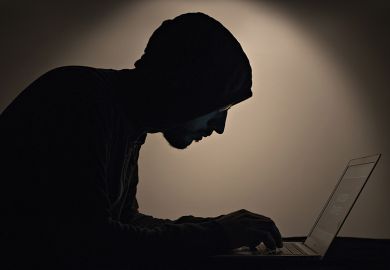Some students flout the rules governing online examinations despite having the same reservations about cheating as their honest peers, and even after friends have been punished for misbehaviour.
An Australian study has unearthed counter-intuitive findings about the complex motivations that underpin educational misconduct. The survey of almost 8,000 exam-sitters at a Victorian university found that cheating was statistically more likely among those whose acquaintances not only cheated, but had been caught doing so.
The study, published in the journal Assessment & Evaluation in Higher Education, investigated self-reported cheating rates in recent online examinations. The online survey was made accessible for several weeks during the university’s mid-2021 exam period, when most tests were conducted online because of Covid lockdowns.
Students were encouraged to complete the survey as soon as possible after their exams, with the experience still fresh in mind. While an unusually low 2.8 per cent of respondents admitted having cheated – a figure overshadowed by the 4.2 per cent who “preferred not to say”, and by reports of a cheating “epidemic” that has spurred some universities to wind back online exams – the primary aim was not to measure cheating rates. “Our real goal was to explore their motivations,” said lead researcher Michael Henderson, a professor in the Faculty of Education at Monash University.
The study found that both cheats and honest students cited similar disincentives for cheating: their self-image as people of integrity, the prospect of feeling guilty and the risk of punishment. “Students who cheat do not do so without conflict,” the paper says.
“This supports the notion that institutions and educators need to help strengthen students’ range of motivations to not cheat, rather than assuming one particular factor is at the heart of the problem. It is important to not oversimplify their motivations. Focusing on any one variable is unlikely to remove or even significantly reduce cheating.”
Professor Henderson said educators tended to “fall into the trap” of assuming that cheats had no second thoughts or compunctions. “We can’t afford to stop thinking about assessment security, but also, we shouldn’t stop thinking about how we can engender a culture of integrity.”
The survey found that students were more likely to report cheating after sitting for four exams rather than just one or two. Cheating was also more common when students were given a “window” of perhaps 12 or 24 hours to complete their tests, rather than being obliged to take them at set times.
Register to continue
Why register?
- Registration is free and only takes a moment
- Once registered, you can read 3 articles a month
- Sign up for our newsletter
Subscribe
Or subscribe for unlimited access to:
- Unlimited access to news, views, insights & reviews
- Digital editions
- Digital access to THE’s university and college rankings analysis
Already registered or a current subscriber?








